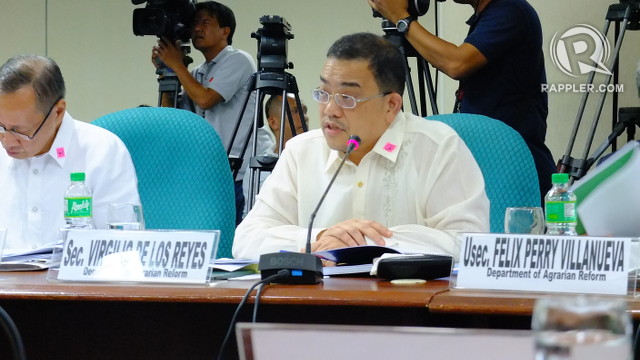SUMMARY
This is AI generated summarization, which may have errors. For context, always refer to the full article.
MANILA, Philippines – With the third deadline for agrarian reform missed and a bill to extend the program virtually up in the air, is it time to change the Department of Agrarian Reform (DAR) leadership?
Ifugao Representative Teddy Baguilat Jr, chairman of the House agrarian reform committee, echoed the sentiments of agrarian reform advocates that aggressive leadership is needed in the department now more than ever.
Is current DAR Secretary Virgilio “Gil” De Los Reyes exemplifying the revolutionary spirit that should, according to advocates, be driving the agrarian reform program?
With some 78,000 hectares still not covered by the Comprehensive Agrarian Reform Program Extension with Reforms (CARPER) and 700,000 hectares still not titled to farmer-beneficiaries, can De Los Reyes finish the job?
Naysayers say the DAR chief’s training as a lawyer could be holding him back.
“I hear some people say: ‘We don’t need a lawyer. A lawyer is not appropriate as head of agrarian reform.’ It has to be an advocate because the law is already there and you can hire all lawyers to help you with all your legal problems,” Baguilat told Rappler Investigative Editor Chay Hofileña.
Watch the interview here:
“Because you are a lawyer, you are stymied by perceptions. You’re worried someone will sue you so you kind of hold back. You don’t want to be facing court cases way after you retire,” the lawmaker said.
After all, as Delos Reyes himself said, the remaining lands the DAR still has to cover are the private agricultural lands – lands claimed by powerful families and corporations with all the resources to file and pursue legal cases against government officials. Distributing these lands will put DAR through its toughest test.
‘Use the full force of law’
Baguilat said, however, that the DAR won’t be fighting without any weapons. The law is behind the DAR chief and now is the time to make use of its power.
“Facing cases on land issues I think is something that is supposed to be accepted whenever you work with DAR. We shouldn’t be scared or be afraid to confront these cases…It’s just a matter of exercising your political will and saying, despite all the opposition from big-time landlords, we should use the full force of the bureaucracy to ensure the program gets going.”
The DAR’s track record in distributing land to farmers has been less than impressive, lamented agrarian reform groups and farmer organizations. (READ: Bishops to Aquino: Relieve DAR chief)
Danny Carranza, secretary-general of Katarungan (Kilusan Para Sa Repormang Agraryo at Katarungang Panlipunan) called Delos Reyes the worst-performing Cabinet secretary in the Aquino administration. Under Delos Reyes, the DAR has failed to accomplish even 70% of its annual targets, he said.
The DAR has blamed technical complications for the enormous CARPER backlog.
These complications include damaged or missing land titles, an incomplete database of CARP-able land and the processing of documents, DAR Undersecretary for Legal Affairs Anthony Parungao told Rappler.
Baguilat agrees that technicalities and legalities are important in balancing the needs of all parties affected by land redistribution, but noted that “at the end of the day, it’s whether you were able to issue the mandate or the circular that had your staff or bureaucracy working towards the implementation of agrarian reform.”
Because of the snail’s pace of CARPER implementation, many farmers have lost faith in the DAR, an observation Baguilat made while listening to farmers’ concerns during his committee’s hearings.
These farmers should have been Delos Reyes’ most ardent supporters and loyal allies. A revolutionary DAR chief would err on the side of farmers instead of with landlords, said another agrarian reform advocate in Congress, CARPER author Walden Bello.
Restoring this faith does not require rocket science, said Baguilat.
“You only need 5 landmark cases – some in Negros, Quezon, Bontoc. Just give out land there and farmers will believe this guy means business. If he can do that, the credibility and the reputation as an advocate is going to be there. But nothing is happening.”
Still much left to do
This diagnosis is bleak given the enormous work DAR still faces. While Baguilat believes the agency has been successful in bequeathing land titles to some farmers, there are reports of the titles going to the wrong farmers.
DAR has not succeeded in providing sufficient support services needed to help farmers reap the rewards of land ownership. Needed support services include farm-to-market roads, post-harvest facilities, affordable loan programs for farmers, and helping farmers market their products.
Without these support services, which the CARPER law says government must provide, farmers end up leasing their land back to landlords or other wealthy people.
In this so-called “aryendo” system, where farmers officially own the land title but the landlords still control the land and the crops produced.
“This defeats the purpose of agrarian reform which is supposed to empower the tiller and emancipate the farmer,” said Baguilat.
If a bill certified urgent by President Benigno Aquino III is passed, the DAR will have only two years more to put the remaining landholdings under agrarian reform.
To prove he is determined in fulfilling his mandate, Delos Reyes should just issue a “blanket issuance of all Notices of Coverage,” the document that kickstarts the process of land distribution, said Baguilat.
Now is the time for decisive action, not dilly-dallying, he concluded.
“In two years’ time, dapat tapusin natin ito (we should finish this). Just because it’s almost over doesn’t mean we should just play it safe, avoid lawsuits and leave it to the next administration. The task before us is still enormous.” – Rappler.com
Add a comment
How does this make you feel?

There are no comments yet. Add your comment to start the conversation.